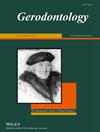Chronic periodontitis and risk of cerebro-cardiovascular diseases among older Koreans
Abstract
Background and Objective
There is a relative lack of evidence from observational studies of older populations investigating the association between chronic periodontitis and cerebro-cardiovascular diseases. Accordingly, we investigated the risk of cerebro-cardiovascular diseases according to the severity of chronic periodontitis among older adults.
Methods
Data on older adults with chronic periodontitis were extracted from the Korea National Health Insurance Service-Senior Cohort Database using diagnosis codes and dental procedures. Participants were divided into two exposure groups. Among 46 737 participants eligible for inclusion, 21 905 (46.9%) had newly diagnosed mild chronic periodontitis, and 24 832 (53.1%) had newly diagnosed severe chronic periodontitis. To determine the risk of cerebro-cardiovascular diseases, including ischemic stroke, haemorrhagic stroke, and myocardial infarction, multivariable-adjusted Cox proportional hazards modelling was used to calculate hazard ratios (HRs) and 95% confidence intervals (CIs) in this retrospective follow-up study.
Results
A total of 3453 (7.4%) outcomes were identified during a mean follow-up of 6.1 years. Kaplan–Meier analysis revealed that disease-free probability was lower in the severe group than in the mild group (log-rank P < .001). In the multivariable-adjusted model, the HR for cerebro-cardiovascular diseases in the severe group (relative to the mild group) was 1.16 (95% CI: 1.09–1.25). In individual outcome analysis, ischemic stroke and myocardial infarction were associated with chronic periodontitis severity, but haemorrhagic stroke was not.
Conclusion
The severity of chronic periodontitis could be associated with the risk of cerebro-cardiovascular diseases in older adults.

 求助内容:
求助内容: 应助结果提醒方式:
应助结果提醒方式:


